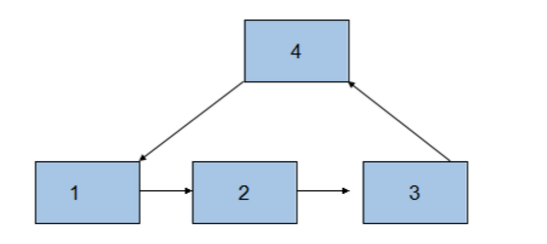13.单链表中,取出环的起始点
我们平时碰到的有环链表是下面的这种:(图1)

上图中环的起始点1。
但有可能也是下面的这种:(图2)

此时,上图中环的起始点是2。
方法1:
这里我们需要利用到上面第8小节的取出环的长度的方法getCycleLength,用这个方法来获取环的长度length。拿到环的长度length之后,需要用到两个指针变量first和second,先让second指针走length步;然后让first指针和second指针同时各走一步,当两个指针相遇时,相遇时的结点就是环的起始点。
注:为了找到环的起始点,我们需要先获取环的长度,而为了获取环的长度,我们需要先判断是否有环。所以这里面其实是用到了三个方法。 代码实现:
方法1的核心代码:
// 方法:获取环的起始点。参数length表示环的长度 public Node getCycleStart(Node head, int cycleLength) { if (head == null) { return null; } Node first = head; Node second = head; // 先让second指针走length步 for (int i = 0; i < cycleLength; i++) { second = second.next; } // 然后让first指针和second指针同时各走一步 while (first != null && second != null) { first = first.next; second = second.next; if (first == second) { return first; } } return null; }
完整版代码:(含测试部分)
public class LinkCycleStart { public Node head; public Node current; // 向链表中添加数据 public void add(int data) { // 判断链表为空的时候 if (head == null) {// 如果头结点为空,说明这个链表还没有创建,那就把新的结点赋给头节点 head = new Node(data); current = head; } else { current.next = new Node(data);// 创建新的结点,放在当前节点的后面(把新的节点和链表进行关联) current = current.next;// 把链表的当前索引向后移动一位,此步操作完成之后,current结点指向新添加的那个结点 } } // 方法重载:向链表中添加结点 public void add(Node node) { if (node == null) { return; } if (head == null) { head = node; current = head; } else { current.next = node; current = current.next; } } // 方法:遍历链表(打印输出链表。方法的参数表示从节点node开始进行遍历 public void print(Node node) { if (node == null) { return; } current = node; while (current != null) { System.out.println(current.data); current = current.next; } } class Node { // 注:此处的两个成员变量权限不能为private,因为private的权限是仅对本类访问 int data;// 数据域 Node next;// 指针域 public Node(int data) { this.data = data; } public int getData() { return data; } public void setData(int data) { this.data = data; } public Node getNext() { return next; } public void setNext(Node next) { this.next = next; } } // 方法:检测单链表是否有环 public Node hasCycle(Node head) { if (head == null) { return null; } Node first = head; Node second = head; while (second != null) { first = first.next; second = second.next.next; if (first == second) {// 一旦两个指针相遇,说明链表是有环的 return first; } } return null; } // 方法:有环链表中,获取环的长度。参数node代表的是相遇的那个结点 public int getCycleLength(Node node) { if (head == null) { return 0; } current = node; int length = 0; while (current != null) { current = current.next; length++; if (current == node) { return length;// 当current结点走到原点的时候 } } return length; } // 方法:获取环的起始点。参数length表示环的长度 public Node getCycleStart(Node head, int cycleLength) { if (head == null) { return null; } Node first = head; Node second = head; // 先让second指针走length步 for (int i = 0; i < cycleLength; i++) { second = second.next; } // 然后让first指针和second指针同时各走一步 while (first != null && second != null) { first = first.next; second = second.next; if (first == second) { return first; } } return null; } public static void main(String[] args) { LinkCycleStart list1 = new LinkCycleStart(); Node second = null; // 把第二个结点记下来 // 向链表中添加数据 for (int i = 0; i < 4; i++) { list1.add(i); if (i == 2) { second = list1.current;// 把第二个结点记下来 } } list1.add(second);// 将尾结点指向链表的第二个结点,于是单链表就有环了 Node current1 = list1.hasCycle(list1.head);// 获取相遇的那个结点 int length = list1.getCycleLength(current1); System.out.println("环的起始点是" + list1.getCycleStart(list1.head, length).data); } }
测试结果:
环的起始点是2




